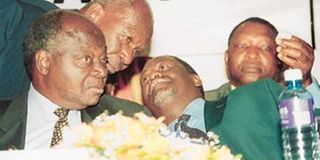Kenyans’ hope for change faded after things began to fall apart

Mwai Kibaki, Moody Awori, Raila Odinga and Karisa Maitha weigh their options for unity at a rally in the countdown to the 2002 General Election. PHOTO | FILE | NATION MEDIA GROUP
What you need to know:
- For the first time since Independence, power was changing hands formally.
- Memorandum of Understanding between National Alliance Party of Kenya and the Liberal Democratic Party that spelt out a 50:50 power-sharing ratio was quickly trashed.
- President Kibaki recovered and steered the Narc ship, but the betrayal of the MoU haunted and defined his first term in office.
The swearing-in of Mwai Kibaki on December 29, 2002, as Kenya’s third President was a ceremony like no other.
Nairobi’s iconic Uhuru Park was in a carnival mood as a sea of humanity came to witness the momentous ceremony.
For the first time since Independence, power was changing hands formally.
The first transition in 1978 followed the death of Kenya’s first President Jomo Kenyatta. But this time, a sitting Head of State, though not a candidate, was transferring power to a new leader elected through the ballot.
Kenyans were optimistic that the new administration would transform their lives. But it did not take long for the optimism that brought in the Narc administration of Kibaki to begin fading.
First, the Summit that comprised Narc luminaries and chaired by Mr Moody Awori was quietly dismantled.
QUICKLY TRASHED
Second, and more fundamentally, the Memorandum of Understanding between National Alliance Party of Kenya and the Liberal Democratic Party that spelt out a 50:50 power-sharing ratio was quickly trashed.
Apparently, some insiders took advantage of the President’s poor health to make skewed appointments that largely favoured President Kibaki’s people from Central Kenya. Decisions were made that totally negated the MoU. The LDP wing felt betrayed.
Kibaki’s early days in power were eventful and tragic. The President had not recovered fully from the injuries he had suffered in an accident in Machakos just a few moments before the polls.
At one point, his condition deteriorated and he was admitted to Nairobi Hospital, causing a scare.
COPTER CRASH
In the meantime, the newly-appointed Cabinet ministers organised homecoming parties to celebrate their ascension to power. It was during one of those parties that a tragedy struck.
Mr Awori, chairman of the now-defunct Summit and who had been appointed Home Affairs minister, organised a homecoming party at his Funyula home in Busia, which was attended by several Cabinet ministers, high-ranking government officials and political activists who had campaigned for Narc.
But in the evening, a helicopter carrying several ministers and high-level visitors crashed soon after take-off, killing Ahmed Khalif, the Labour minister.
Others escaped with minor injuries but a few were badly hurt.
President Kibaki recovered and steered the Narc ship, but the betrayal of the MoU haunted and defined his first term in office.
Mr Awori’s new book, Riding on a Tiger, published by Moran Publishers and which will be launched in Nairobi on Tuesday, encapsulates the drama — the highs and lows of Kibaki’s administration — and illuminates the theme of betrayal that has defined Africa’s post-independence politics.




